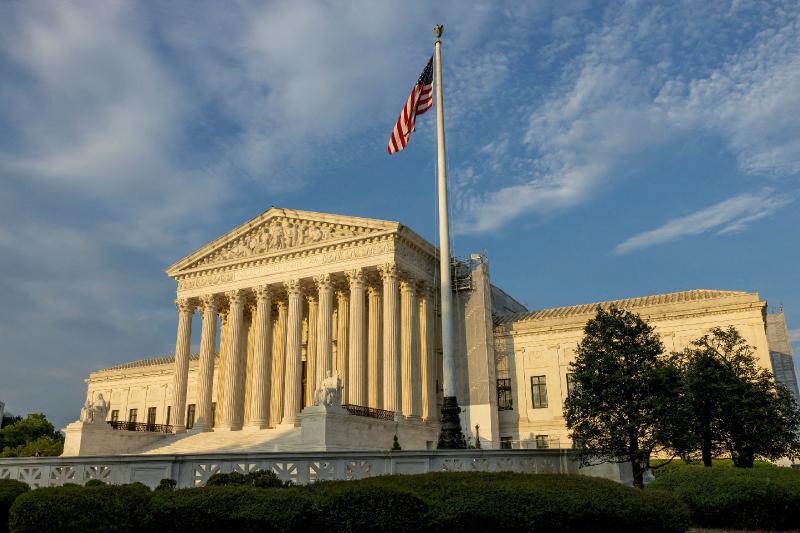Cheer the Supremes' Grants Pass ruling that lets states clean up homeless encampments



Of all the 61 rulings issued by the US Supreme Court in the term that officially ended Monday, the one most likely to impact Americans' daily lives — and it should in New York — is one that received little attention: Grants Pass v. Johnson, upholding an Oregon town's right to outlaw homeless encampments.
In cities plagued by street living, the negative ripple effects are constant.
Parents walking their children to school have to navigate around discarded needles and human waste; businesses suffer as customers avoid areas littered with debris and cardboard shelters; people risk getting mugged or harassed walking by encampments on their way to work.
For years, municipal officials in nine states have been unable to clean up the encampments.
Their hands were tied after lawyers for the ACLU, Coalition for the Homeless and other organizations in the advocacy industrial complex went to court and won rulings that protected sleeping outside as a right.
The advocates, and the judges who sided with them, claimed that fining people for living in public spaces amounted to "cruel and unusual punishment," a violation of the US Constitution.
Preposterous but true: Vagrants had rights, but everyone else had to just deal.
That is, until the Supremes ruled 6-3 on June 29 that there's nothing unconstitutional about clearing out encampments and fining people who take over public property.
Justice Neil Gorsuch, writing for the majority, said local elected officials, not judges, should be calling the shots on how to handle homelessness.
As soon as the ruling was announced, many public officials welcomed it.
Fresno, Calif., Mayor Jerry Dyer called it a "game changer," adding, "We will now have the opportunity to once again enforce the city of Fresno's no-camping ordinance."
San Francisco Mayor London Breed said her city is eager to help those struggling with addiction and mental illness, but people who refuse help "will not be allowed to camp on our streets."
With a mayoral election coming up Nov. 5, San Franciscans will have a choice between Breed, who is outspoken about removing the city's sprawling tent slums, and candidates who side with the homeless advocacy groups.
Now voters will get to decide how to deal with homelessness, not judges.
This nationwide upheaval began in the little town of Grants Pass, Ore., which tried to ban sleeping under cardboard boxes, tents and blankets in public places.
Homelessness advocates sued, citing a Ninth Circuit Court of Appeals ruling, Martin v. City of Boise, that established public camping as a right in the nine states it oversees.
In every one of those nine states — Alaska, Arizona, California, Hawaii, Idaho, Montana, Nevada, Oregon and Washington — street living has soared since the Martin ruling was issued in 2018: up 51% in Alaska, 46% in Idaho and 46% in Oregon, according to the Department of Housing and Urban Development's annual homelessness survey.
Legalizing living rough encourages it.
Had the Supreme Court ruled against Grants Pass, all 50 states likely would be facing a surge in street living.
The Grants Pass ruling is a bold denunciation of judges who step in to make decisions that should be left to locally elected leaders.
Are you listening, Mayor Adams?
New York City is a victim of such judicial activism in its own homelessness policies.
For over four decades, New York City residents have been forced to foot an enormous bill — billions of dollars a year — because of a consent decree that settled a lawsuit brought by advocates.
To this day, that decree and subsequent court rulings dictate the city's homeless policies, down to details like meals served and square footage per person.
The big winner is the homeless advocacy industrial complex that runs shelters, files lawsuits and profits off the exorbitant spending.
New York City is compelled by the courts to guarantee shelter for all comers — and it will bankrupt us.
Mr. Mayor, it's time to challenge the courts and wrest control of homeless policy from judges.
If little Grants Pass can do it, the Big Apple can, too.

Betsy McCaughey is a former lieutenant governor of New York.

Tags
Who is online
445 visitors

Preposterous but true: Vagrants had rights, but everyone else had to just deal.
That is, until the Supremes ruled 6-3 on June 29 that there's nothing unconstitutional about clearing out encampments and fining people who take over public property.
Has anyone noticed that we eventually need a Supreme Court ruling from the current Court to go back to what we once knew was right.